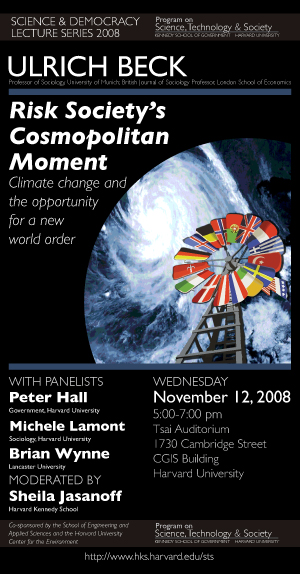Program on Science, Technology and Society at HarvardHarvard Kennedy School of Government | Harvard University |
|||||||
|
|
Risk Society's Cosmopolitan Moment: Climate Change and the Opportunity for a New World OrderUlrich BeckProfessor of Sociology, University of Munich; British Journal of Sociology Professor, London School of Economics November 12, 2008, 5:00pm–7:00pm AbstractGrowing certainty that climate change is human-made and will have catastrophic consequences has reshuffled the cards for society and politics across the entire world. But it is a mistake to see climate change as an irreversible path to an apocalyptic future for humankind. Beyond belief and beyond hope, climate change opens up the opportunity to overcome the bounds of national politics and to found a "cosmopolitan realism" in the interests of nation states. Climate change is pure ambivalence. But it is precisely this feature that can be uncovered by the art and practice of the sociologist's methodological skepticism and be publicly turned against the dominant (discourses of?) cynicism and paralysis. In this sense, the sociology of climate change can serve as a heuristic for the productive creativity of uncertain times. PanelPeter HallGovernment, Harvard University Michèle LamontSociology, Harvard University Brian WynneLancaster University Moderated bySheila JasanoffHarvard Kennedy School About the speakerUlrich Beck studied at Munich University in the late 1960s, and received his Ph.D. there in 1972. In the 1970s and 1980s he was a professor at the Universities of Münster and Bamberg, and since 1992 he has been Professor of Sociology and director of the Institute for Sociology of Munich University. He also the British Journal of Sociology Professor at the London School of Economics. His hugely influential 1986 work, Risikogesellschaft: Auf dem Weg in eine andere Moderne (trans. English 1992, Risk Society: Towards a New Modernity) reframed risk as a sociological category, and his concept of "reflexive modernization" fundamentally reshaped both theoretical and policy discussions concerning science and technology. Beck will draw on his recent work on the uncertainties and ambivalence of contemporary cosmopolitan societies to explore global responses to the risks of climate change. Co-sponsored by the School of Engineering and Applied Sciences and the Harvard University Center for the Environment. |
||||||
